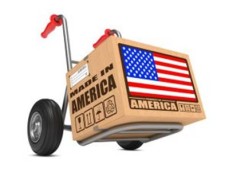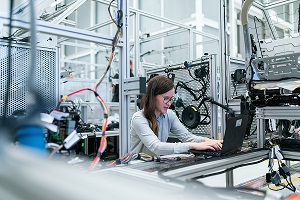Global Prediction Responses and Reshoring by Alex Whitehorn
 Analyzing the vast array of responses to the Reshoring Institute’s 2024 annual prediction survey, it becomes quickly apparent that many of the rapid changes we as a nation are facing directly intertwine with the concept of Reshoring.
Analyzing the vast array of responses to the Reshoring Institute’s 2024 annual prediction survey, it becomes quickly apparent that many of the rapid changes we as a nation are facing directly intertwine with the concept of Reshoring.
Reshoring, a strategy already familiar to our audience, centers on the endeavor to bring supply chains closer to home. It’s not merely a reaction to global disruptions but a conscious effort to mitigate risks and reduce carbon footprints. Predictions for 2024 underscore the urgency of this environmental imperative, particularly as climate concerns escalate, making reshoring an increasingly more attractive solution as a means to minimize ecological impacts.
The reduction of inflation emerges as a pivotal driver for reshoring initiatives. Beyond its macroeconomic implications, a decrease in inflation fosters an environment conducive to increased investment across sectors, including manufacturing. Policies such as the Infrastructure Investment and Jobs Act and the Chips Act contribute to a robust manufacturing ecosystem, incentivizing reshoring efforts and fostering technological innovation.
Challenges loom on the horizon, however, as geopolitical tensions and congressional discord cast shadows over global supply chains. Conflicts in Congress threaten to impede the passage of legislation supportive of manufacturing, highlighting the need for bipartisan cooperation in reshaping trade policies. Despite these worrying circumstances, there are potential outcomes that offer glimpses of a more open trade environment, providing impetus for reshoring initiatives to thrive.
Some predict the manufacturing landscape at the border to experience a surge, albeit tempered by the fluctuating value of the peso. Despite these fluctuations, the allure of lower costs enhances the competitiveness of domestic manufacturing. Advancements in technology aimed at combating climate change simultaneously improve energy availability, fostering an environment conducive to reshoring endeavors.
Reshoring converges with technological advancements, particularly in artificial intelligence (AI), marking a paradigm shift in manufacturing and supply chain management. The widespread adoption of AI across industrial and private settings underscores its transformative potential in enhancing operational efficiency and driving reshoring strategies forward. It is not unreasonable to assume that within the near future, businesses that have not integrated the use on some level of AI or machine learning into their processes will find themselves left behind on an industry scale.
The resilience of reshoring initiatives is further underscored by mounting challenges facing global supply chains, precipitated by geopolitical tensions and economic uncertainties. As companies reassess their global manufacturing strategies, reshoring emerges as a compelling alternative, buoyed by government incentives and evolving market dynamics. The predictions for 2024 delineate a complex tapestry of economic, political, and technological trends, all intersecting with the overarching theme of reshoring. As nations navigate the complexities of a rapidly evolving global landscape, reshoring stands not merely as a strategic imperative but as a testament to the adaptability and resilience of modern supply chains in the face of uncertainty.
About the Author
Alex Whitehorn is a graduating senior from the University of Utah’s David Eccles School of Business, specializing in Operations and Supply Chain with a minor in Management. In his time at the University of Utah, he acted as a Co-President of the Supply Chain Club and founding officer of the Car Club. He also worked with the University under their Career Services department, during which time he collaborated with a variety of companies to ensure graduating seniors found successful career paths.
Outside of school, Alex worked with Northrop Grumman as a global supply chain intern (summer 23) within their procurement division, allowing him to gain a deep understanding of problem-solving skills and optimization. Additionally, Alex is currently completing a capstone project with Fortem Technologies with a focus on supplier selection, supplier quality, and supplier maintenance processes. In his free time, Alex enjoys skiing, automotive photography, and reading.



